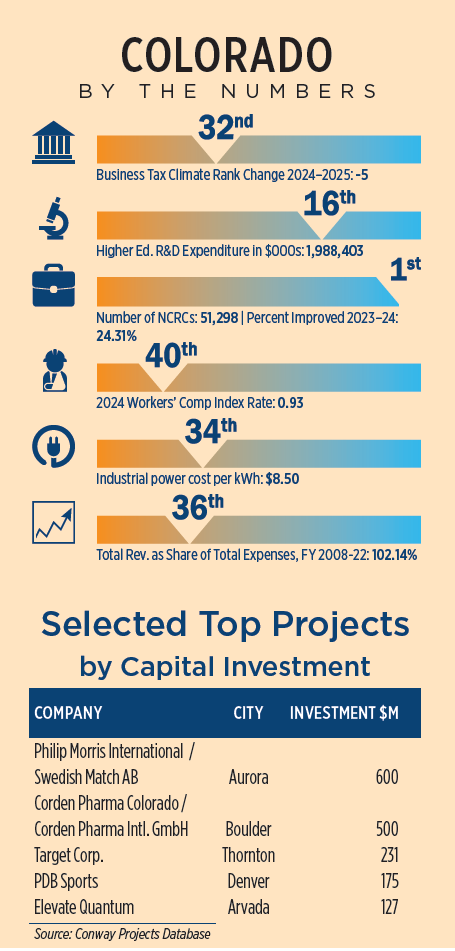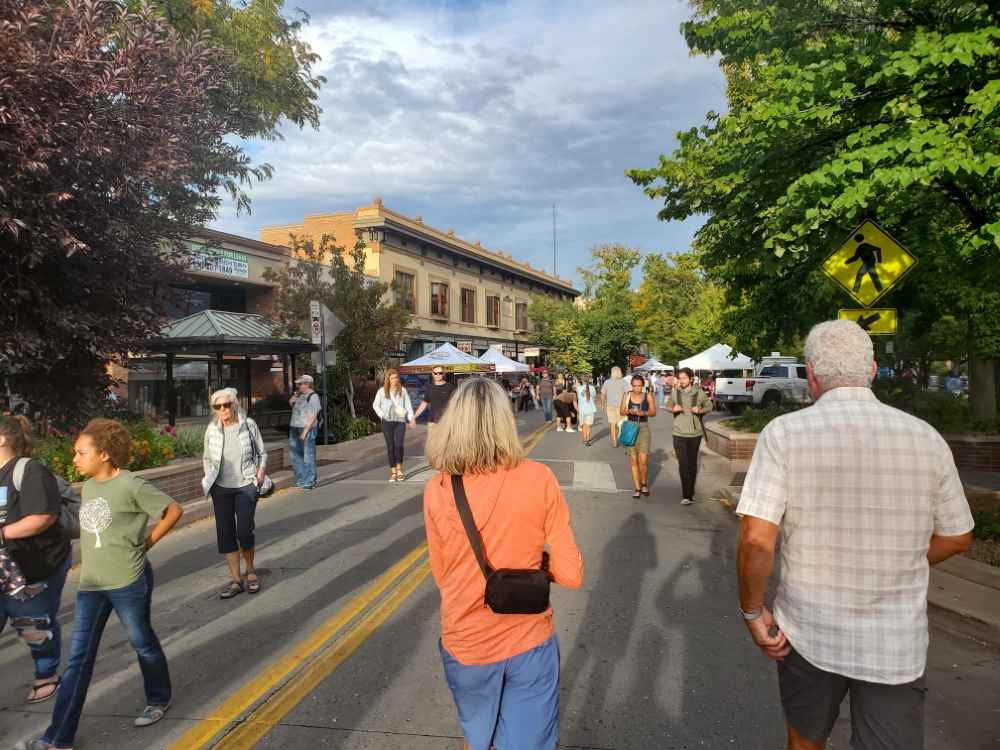Workforce and way of life propel a town in Western Colorado.
What’s the best way to follow a record-breaking year for economic development? For Grand Junction, Colorado, it was to ink an all-time job-creating deal.
In February, the Grand Junction Economic Partnership (GJEP), in conjunction with Colorado Gov. Jared Polis and the Global Business Division of the Colorado Office of Economic Development and International Trade, announced that Tennessee-based Morgan Mining will bring close to 900 jobs to the town of 70,000 on the western slope of the Rocky Mountains. The new jobs will pay an average of $92,000, well above the average salary of surrounding Mesa County.
“To say it’s a historic win is really an understatement,” GJEP Executive Director Curtis Englehart told Site Selection in March. “When you look at 893 jobs at the salaries they’re talking about, the economic impact for us is just huge. It’s why we’re really optimistic about 2025.”
Engelhart describes Morgan as a specialized mining services company.
“They do everything from mining equipment repair to contract work for mines all over the nation,” he says. “They can supply the specialized staff to go out, complete the job and then come back. They will also be hiring engineers and mechanics and leadership staff.”
Officials in Colorado and Mesa County had to persuade Morgan that expanding to Grand Junction was a better option than doing so at the company’s current headquarters in Knoxville, Tennessee. Helping to tip the scales, the Colorado Economic Development Commission approved a Job Growth Incentive Tax Credit totaling more than $10 million.
“They’re really pleased with what we offer from a workforce perspective and a community perspective, as well,” Englehart says.

For the Record
Released in late March, GJEP’s 2024 Annual Report detailed nine business relocations and expansions projected to deliver a record $91 million in total economic impact for the 12 months ending in January. That’s nine times the impact of just two years ago and close to double Grand Junction’s total for 2023. Top investments included a $25 million Amazon distribution facility and the headquarters relocation of outdoor equipment company Goose Gear, formerly based in California, which will create about 50 jobs. What accounts for the surge of growth?
“Historically,” says Englehart, “the Grand Junction area has been a heavy oil and gas industry [region]. But over the last 10 to 12 years, we’ve seen really great diversification across the board. We see a lot of growth in health care, aerospace and aviation. The outdoor industry has been a huge driver for us, and general manufacturing, as well.
“We are centrally located between Salt Lake City and Denver, so you can get to either in three-and-a-half to four hours, which really helps from a freight distribution standpoint,” he says. “We have a very robust workforce, and we’re home to Colorado Mesa University, one of the fastest growing universities in the nation. From a quality-of-life perspective, the possibilities here are endless. And we’re small enough that you can pick up the phone or have lunch with the city council members or county commissioners or the president of the university, but then we have a lot of urban benefits, as well.”
In a further boon to Mesa County, a public-private partnership between the City of Grand Junction and its Downtown Development Authority continues to develop a former Superfund site on the Colorado River that was ceded to Grand Junction by the federal government. The 140-acre Riverfront at Las Colonias includes abundant greenspace, ponds, cultural spaces and a high-end amphitheater. On 15 acres of Las Colonias, GJEP is developing a business park whose anchor tenant, Oak Star Bank, broke ground in September on a 12,000-sq.-ft. facility that’s to feature a restaurant, retail and Class A office space.
“We have five shovel-ready sites at the park that are ready to go. It’s very incentivized,” says Englehart, “to spur economic growth in that area.”
“We’re seeing arguably the best economy we’ve had in in Mesa County in quite some time.”
— Curtis Englehart, GJEP Executive Director
Boulder Wins the Big One
Grand Junction isn’t the only town in Colorado with great cause to celebrate. In a highly awaited announcement delivered on March 27, the storied Sundance Film Festival unveiled picturesque Boulder as its new home, beginning in 2027.
The festival has run for 41 years in Park City, Utah, where it delivered an economic impact in 2024 of $132 million with an estimated 1,730 jobs and $70 million in wages. Six cities competed to be the festival’s new site, with Boulder, Salt Lake City and Cincinnati being named as finalists.
“Boulder is an art town, tech town, mountain town, and college town,” said Sundance Institute Acting CEO Amanda Kelso. “It is a place where the Festival can build and flourish. This is the beginning of a bold, new journey as we invite everyone to be part of our community and to be entertained and inspired. We can’t imagine a better fit than Boulder.”
In a statement, the Sundance Institute said that “the heart of the festival” will occur in downtown Boulder, utilizing a wide array of theaters and venues and public spaces around the pedestrian-only Pearl Street Mall. Parts of the University of Colorado Boulder campus will be activated as well. The festival plans to work with the Boulder host committee, it said, to enhance infrastructure and accommodations.
The selection of Boulder followed a meticulous, year-long process that included a request for information on locations, request for proposals, meetings and site visits.
“Boulder’s welcoming environment,” the festival determined, “aligns with the ethos the Sundance Film Festival developed in Park City — growing with a community rooted in independent thought, artistic exploration and social impact. The city’s convergence of arts, technology, music, food, entrepreneurship and education presents unique and exciting programming opportunities for future iterations of the Festival.”
“As change is inevitable, we must always evolve and grow, which has been at the core of our survival,” said Sundance Institute President and Founder Robert Redford in a statement. “This move will ensure that the Festival continues its work of risk taking, supporting innovative storytellers, fostering independence, and entertaining and enlightening audiences. I am grateful to the Boulder community for its support, and I look forward to seeing what the future holds for the Festival there.”

